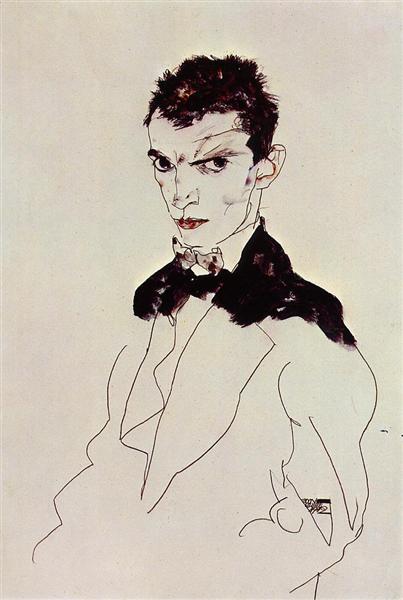Description
Egon Schiele, one of the most emblematic figures of Austrian expressionism, achieves through his work "self -portrait" of 1912 capture the essence of his intense subjectivity, internal struggle and the search for identity. Schiele is known for his unique style, which combines brutal expressionism with an sharp figurative technique, characteristics that are present in this self -portrait. The composition of the work presents the artist as the center, a figure that, in its apparent vulnerability, faces the viewer with a penetrating and provocative look.
The use of color in this paint is particularly remarkable. The palette is reduced to tones that seem like austric, predominating a neutral background that accentuates the central figure. Schiele uses a combination of terrible and gray colors that give a feeling of crudeness and realism, while engendering a melancholic air. The author's skin is represented with pale, almost sick tones, and facial features are highlighted through the use of wavy contours and lines, which transmit both their fragility and their emotional intensity. This effect is amplified by the way Schiele explores human anatomy; His figure seems to blur between flesh and shadow, echoing a constant internal struggle.
Within the figure itself, the details are revealing. The eyes, large and expressive, seem to be the window to a tormented soul, while the shape of its mouth suggests a tension that goes beyond the physical. Schiele presents not only as a portrait of his physical appearance, but rather as a mirror of his darker emotions and thoughts, a concept that resonates through much of his work. This self -portrait is not simply an exercise of representation; It is a statement about the vulnerability and duality of the human being, inviting the viewer to connect with the essence of their internal struggle.
The author's position in the work is equally significant. His way of placing himself, with his arms flexed, suggests both aggressiveness and defensiveness. Here, Schiele faces society with a challenging attitude, reflecting the deep tension between introspection and exposure, a dichotomy that is the essence of expressionism.
Egon Schiele, a contemporary of Gustav Klimt and a prominent member of Vienna's secession, challenged the artistic conventions of his time by entering the topics of vulnerability and sexuality that were often considered taboo. In this self -portrait, as in many of his other works, there are echoes of his personal life, marked by an intense search for acceptance and self -affirmation.
"Self -portrait" of 1912 is erected not only as a testimony of Schiele's talent, but also as a deep reflection on the human condition. The work challenges the observer to contemplate not only the technique and aesthetics, but the personal history that underlies the surface. The clarity in its emotional expression and honesty in its representation invite a dialogue that transcends time, making this piece a masterpiece within the panorama of modern art and an invaluable jewel in the legacy of Egon Schiele.
KUADROS ©, a famous paint on your wall.
Hand-made oil painting reproductions, with the quality of professional artists and the distinctive seal of KUADROS ©.
Art reproduction service with satisfaction guarantee. If you are not completely satisfied with the replica of your painting, we refund your money 100%.

